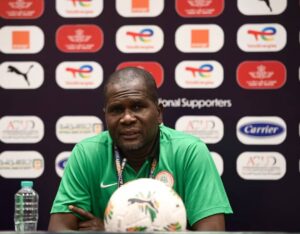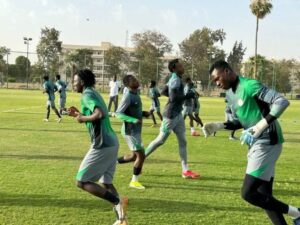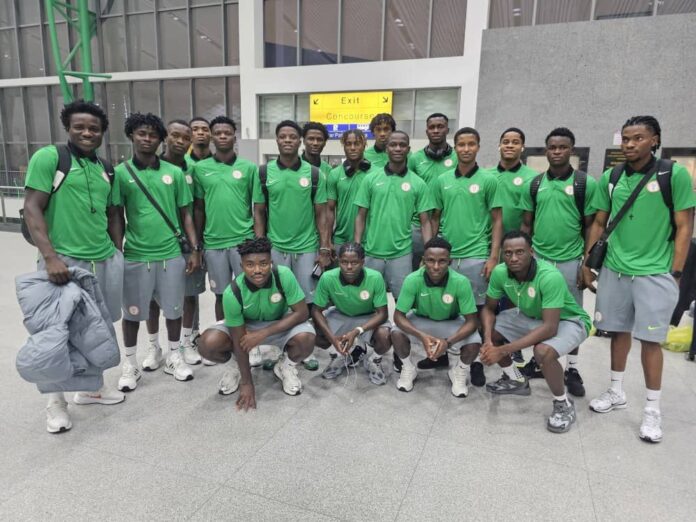Nigeria’s involvement in youth football globally is one that is rich, dramatic, and inspiring. Indeed, the story of Nigeria’s Flying Eagles at the FIFA U-20 World Cup, formerly known as the World Youth Championship, is a mixture of pride, drama, and some would say, unfinished business.
The point is that each new team inherits the dream of going one better, of finally lifting the trophy that has twice slipped away, since making a debut appearance in 1983.

Nigeria’s history in this competition is rich. Bronze in 1985. Two runner-up finishes: in 1989, undone by Jorge Couto’s Portugal, and in 2005 when Lionel Messi tormented Samson Siasia-led Flying Eagles. That tournament, of course, revealed Mikel Obi to the world.
Thus, as Nigeria’s Flying Eagles begin another quest for the World Under-20 trophy, the expectations of football loving Nigerians is that the trophy will be brought home to end the wait.
As the tournament kicks off in Chile on September 27, The Flying Eagles will have to first overcome their contemporaries from Norway, Saudi Arabia, and Colombia in Group F, to signal their intent of going very far in the championship.
However, while football loving Nigerians will ever remain hopeful of a favourable outcome, the indices on ground does not support the optimistic disposition of Nigerians.

During the Confederation of African Football U-20 tournament, Nigeria secured a spot for a 14th appearance at the U-20 World Cup by reaching the last four in that tournament. It wasn’t a spectacularly fantastic outing, as the team managed to pick up the bronze medal after defeating Egypt in a penalty shoot-out
However, the team the team that touched down in Chile a few days ago, seem set for business, as confidence is sky high. The lads seem set to write their names in gold.
The squad, made up of:
Goalkeepers Ebenezer Harcourt (Sporting Lagos), Clinton Ezekiel (Bayelsa United), and Rufa’i Abubakar (Mavlon FC) provide depth at between the posts. Stade de Reims defender Ocheche Amos Onyejefu and Bayelsa United’s Daniel Bameyi add balance in defence.
In midfield, Israel Ayuma of NK Istra and Molde’s Daniel Daga bring European experience, while Manchester City youngster Abdullahi Shitu Ele highlights the firepower up front.
All eyes will be on Daniel Bameyi, the captain of the team and Arieri Kparabo, the 18-year old who plays in Norway.
Bameyi was named in the Best XI at the U-20 Africa Cup of Nations following a stellar performance at the continental tournament. The central defender, who is still 19, would be making his second FIFA U-20 World Cup, after leading the Flying Eagles to the quarter-finals at Argentina 2023.
For Kparabo, the scoring sensation who moved to Norwegian top-flight side Lillestrom in February on a four-year deal after impressing for NNL side Beyond Limits Football Academy, where he scored a staggering 22 goals in just 15 matches, including three hat‑tricks, this is the time to prove his worth.
The 18-year-old broke out internationally at the 2024 WAFU U-20 Championship and was a key part of the national team squad at the U-20 Africa Cup of Nations earlier this year.
Nigeria’s Flying Eagles touched down in Santiago last week and wasted no time getting to work ahead of the 24th FIFA U20 World Cup
The squad was put through their first full session last Wednesday evening at the Cancha Liga Training Pitch, by Head coach, Aliyu Zubairu, following a recovery workout earlier in the day at the team’s base, Le Meridien Hotel.
The build-up continued with friendlies against hosts Chile in Rancagua on Saturday which ended in a 1-1 draw and Australia on Tuesday which they won 3-1, to round off their pre-World Cup preparations.
The goals came from Tahir Maigana, Achihi Oseer, and Charles Agada, giving coach Aliyu Zubairu cause for optimism ahead of their opening Group F match.
Now, all attention turns to their first match at the 2025 FIFA U20 World Cup where Nigeria will square it out with Norway on Monday, 29 September, at 9:00pm WAT, at Estadio Fiscal in Talca in their first group match, they then face Saudi Arabia and Colombia in what promises to be a tight group. Zubairu is already sharpening his tactical approach to the tournament.
Aliyu Zubairu was appointed head coach of the Flying Eagles in September 2024 amidst a successful spell at Nigeria Professional Football League (NPFL) side El-Kanemi Warriors of Maiduguri, whom he led to the President Federation Cup.
A respected tactician, the soft-spoken coach previously coached Wikki Tourist of Bauchi and Gombe United in both the top-flight NPFL and second-tier Nigerian National League (NNL). Zubairu left the Warriors following the expiration of his contract in June.
Nigeria’s romance with youth football is rich, dramatic, and inspiring, and nowhere is this more evident than at the FIFA U-20 World Cup, formerly known as the World Youth Championship. Since making their debut in 1983, the Flying Eagles have stamped their presence as Africa’s most consistent team in the competition, reaching the finals twice, thrilling the world with breathtaking comebacks, and producing stars who went on to shine on the global stage.
Their breakthrough came in 1985 in the Soviet Union, where Nigeria stunned many by finishing third. That bronze medal set the tone for future generations. Just four years later, in Saudi Arabia in 1989, the Flying Eagles etched their name into football folklore with the famous “Damman Miracle.” Trailing 4–0 against the Soviet Union in the quarter-final, Nigeria mounted one of the greatest comebacks in world football, scoring four times in the last half-hour to level the match before triumphing 5–3 on penalties. The Flying Eagles rode that momentum all the way to the final, where they fell 2–0 to Portugal, yet returned home as heroes.
Nigeria’s consistency has been remarkable. Hosting the tournament in 1999, the Flying Eagles drew packed crowds across the nation and reached the quarter-finals before bowing to Mali. But it was in 2005 in the Netherlands that Nigeria came closest to glory again. With players like John Obi Mikel dazzling in midfield, the Flying Eagles marched to the final, only to meet a Lionel Messi-inspired Argentina. The little genius struck twice from the penalty spot to deny Nigeria, who settled for another silver medal.
Since then, the team has remained a formidable force. Quarter-final finishes in 2007, 2011, 2019, and 2023 underscore their consistency, even if the elusive trophy remains out of reach. Along the way, the U-20 platform has served as a launchpad for stars such as Mikel Obi, Taye Taiwo, Kelechi Iheanacho, and Victor Osimhen, who have gone on to carry the nation’s footballing hopes at senior level.
In all, Nigeria has qualified for the tournament 13 times, a record unmatched by any African country. They remain the continent’s most successful side at this level in terms of appearances and finals reached, even if the golden crown continues to slip away.




